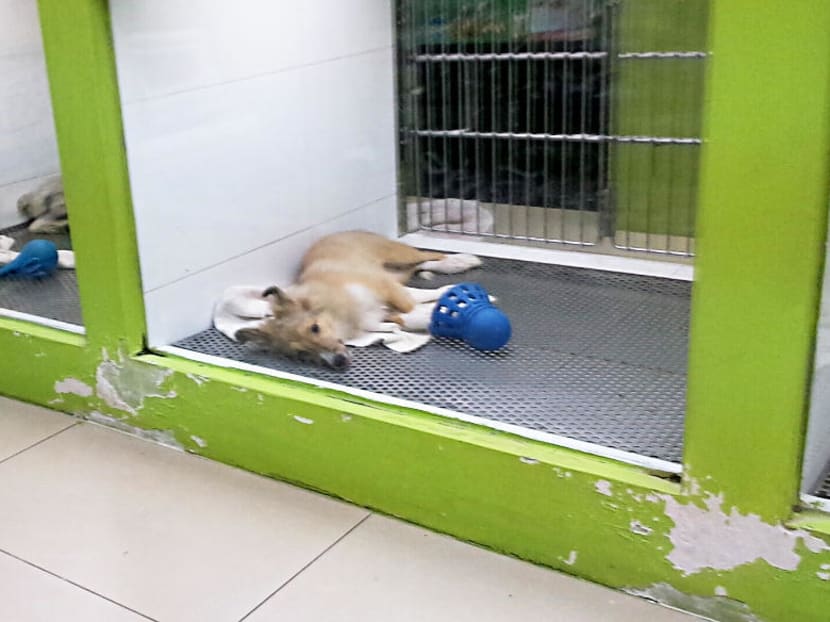New standards for pet industry to kick in from October
SINGAPORE — To raise animal welfare standards in Singapore, a code for the pet industry — which incorporates pet groomers, pet retailers and even pet boarder businesses — will be introduced by the Agri-Food & Veterinary Authority of Singapore (AVA).
SINGAPORE — To raise animal welfare standards in Singapore, a code for the pet industry — which incorporates pet groomers, pet retailers and even pet boarder businesses — will be introduced by the Agri-Food & Veterinary Authority of Singapore (AVA).
To kick in from Oct 1, the Code of Animal Welfare (for the Pet Industry) spells out minimum standards on housing, managing and caring for animals, and pet businesses are expected to comply with them.
It also lists best practices in these areas that pet businesses are encouraged to adopt.
Failure to meet a minimum standard under the code is not an offence, but such incidents can be used to support prosecution or other enforcement actions in animal welfare cases, the AVA said in a press release issued on Thursday (Aug 11).
The code comes two years after the Multi-Stakeholder Collaboration Committee for Animal Welfare (MSCC) submitted a draft.
It will apply to all businesses dealing with pets, or goods and services for pets, including those not licensed by the AVA.
Last year, the Animal Concerns Research and Education Society (Acres) also submitted to the AVA its findings from an undercover operation, showing that several pet shops had failed to meet licensing conditions, which include providing adequately sized enclosures for dogs and cats, proper flooring conditions and sufficient clean drinking water.
The new minimum standards for pet retailers now include ensuring that animals kept and displayed for sale must be from legal sources that demonstrate compliance with regulations and accepted standards of breeding and sale.
The code’s suggested best practices go a step further, encouraging retailers to ensure there is documentation to show that the animal’s grandparents have been tested, where possible, to ensure the pets sold are free of genetic problems.
For pet boarding businesses, they must meet the minimum standard of securing areas for dogs to exercise under supervision, as well ensuring that there are separate rooms for food storage. The animals must also be provided with fresh drinking water at all times.
Best practices they could adopt include allowing all dogs to exercise or be walked at least twice a day on a leash, for at least half an hour each time. Pet businesses will be given a grace period of six months to comply, from Oct 1.
This means that during this time, any violations of the code will not be used as supporting evidence when prosecuting animal welfare offences.
The AVA will be inviting pet businesses and other relevant stakeholders for briefings on the code, and it is also considering another recommendation by the MSCC: A training curriculum for the pet industry.
The proposal is for operators and staff members of pet-related businesses to undergo mandatory training on animal care and handling, and it would cover topics such as animal welfare legislation, licensing requirements and business management.
Cat Welfare Society committee member Veron Lau, 44, said that these are “baby steps” towards better animal welfare, adding that more could be done, such as microchipping at source for cats on sale as part of the licensing requirements.
On the point that there would be no penalties when the minimum standards are not met, she called on greater enforcement on the ground and urged consumers to be alert: “It still boils down to enforcement, and for the public to highlight what they see in the shops that should be improved … to ensure the industry is well-monitored … This is not the final word, because society will continue to progress and people will become more aware (of animal welfare).”
Dr Jaipal Singh Gill, executive director of the Society for the Prevention of Cruelty to Animals here, said that the code is a “good starting point” and ideally, as the industry adjusts to new standards, the legislation should be changed so that those who fail to adhere to the code would face enforcement action, and best practices become the minimum requirements.
MSCC chairman Alex Yam, who is also a Member of Parliament, said that the process involved many stakeholders, and the committee needed to ensure the code is “robust and yet fair, balancing the protection of welfare of animals but not making it an overwhelming (burden) on (the) industry”.







